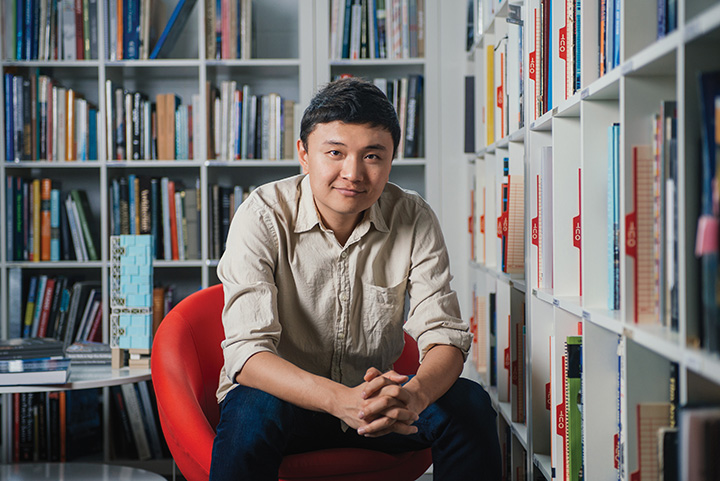Urban Development - Tomorrow

Photo: Bonnie Robinson
Choosing to be an architect was Peng Du’s means to an end, rather than being his life goal. Du, a doctoral candidate at IIT College of Architecture, says his longtime passion has been in improving cities-learning more about how they work, how they’re organized, and how to keep them growing. He decided upon a career in architecture as a way to determine both how the building as a unit could play a more dynamic and sustainable role within its city family and how to encourage more people to make the city their home.
“My vision for the city of the future is that the whole be considered more than the parts,” he says. “We may have fantastically designed single buildings, but we need to determine how they and others can connect and effectively share infrastructure and transportation. We also need to think about how their occupants could more fully enjoy their lives in the urban environment.”
The architecture community is interested in Du’s views and has acknowledged him with the 2013–14 Architectural Research Centers Consortium/King Student Medal for Excellence in Architectural and Environmental Research. Early in 2014, he and mentor Antony Wood, IIT research professor and executive director of the Council on Tall Buildings and Urban Habitat (CTBUH), launched “A Study of the Sustainability Implications of Differing Urban + Suburban Locations in Chicago.” The objective of this first phase of their joint project is to provide a better understanding of the factors that contribute to sustainability (energy/carbon expenditure, mobility, infrastructure, and quality of life) in two different communities: three high-rise units in downtown Chicago and one of the city’s collar suburbs, Oak Park.
In addition to collecting the data from the public resources, building designers, and building management, Du and Wood created a survey and a questionnaire asking participants to provide such information as demographics, household type, residential type, mode of transportation and travel behavior during a typical week, monthly utility usage, land-use characteristics, satisfaction with residential life, and sustainable living behavior. Approximately 200 households in both the tower and low-rise or single-family dwellings have participated. The duo is now in the process of analyzing the data gathered.
“With United Nations statistics indicating that almost one million people are becoming urbanized every week, the debate on whether our cities should develop along dispersed suburban-horizontal or dense urban-vertical directions is at the very heart of sustainability and our continued survival on this planet,” says Wood, also a visiting professor of tall buildings at Tongji University in Shanghai, China. “Yet no one has actually done detailed research to investigate the full carbon and lifestyle implications of living in high-rise or low-rise buildings. This research project could thus hardly be more important, and looks to fill a massive research gap internationally.”
Prior to studying and working in Chicago, Du obtained his Master of Architecture at Tongji University, which has a leading architecture school in Asia, and began earning design and urban best practices awards as far back as 2006. He is currently a CTBUH research assistant, studio instructor, and operations coordinator for CTBUH Asia Headquarters, the 2012 and 2014 CTBUH Shanghai conferences, and CTBUH Skyscraper Center efforts.
A resident of Bronzeville’s South Commons high-rise development and regular user of the Divvy bike-sharing system, Du is looking forward to implementing his vision for the city at the completion of the study in 2016, when he and Wood plan to present their findings and recommend guidelines for increasing a city’s density.
“Peng has tackled this study with an enthusiasm and diligence befitting the project-knowing he was breaking new and important ground-with IIT and the IIT-based CTBUH in support,” says Wood.
More Online
Architectural Research Centers Consortium: www.arccweb.org
Council on Tall Buildings and Urban Habitat: www.ctbuh.org